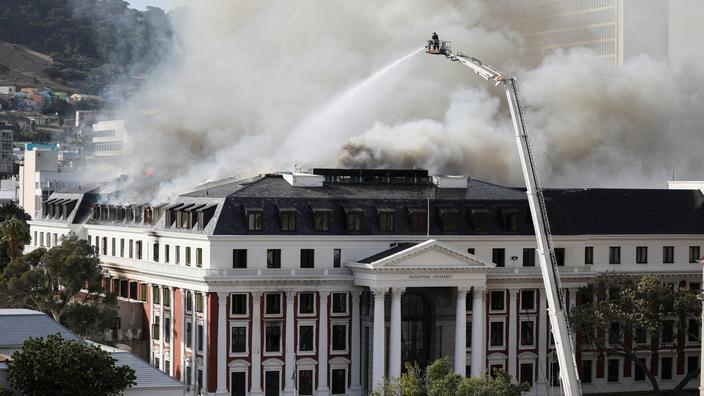The South African prosecution revealed on Saturday January 29 that the man accused of being at the origin of a devastating fire in Parliament in January, who nevertheless intends to plead not guilty, had confessed to investigators after his arrest. .
Read alsoSouth Africa: the devastating fire at the National Assembly under control
The 49-year-old suspect, Zandile Christmas Mafe, was arrested on the morning of January 2 inside the historic building while firefighters were still battling the blaze.
Placed in detention, the man presented as a homeless man appeared on Saturday in Cape Town for a request for release on bail.
The hearing was broadcast live on television.
Questioned after his arrest by the investigators who showed him images of the building in flames, he declared, proudly beating his chest: "
That's Christmas
," the public prosecutor told the court.
In an affidavit read out during the hearing, Christmas Mafe said burning down parliament was "
the right thing to do as it is not helping the citizens of South Africa
". The suspect also explained to the investigators that he took action to prevent President Cyril Ramaphosa from delivering a speech to the Nation scheduled for February and demanding his resignation, as well as the release of the murderer of an anti-apartheid fighter and an aid 1500 rand (86 euros) for all South Africans without income.
The firefighters had fought for more than 48 hours before controlling the fire which caused no casualties "
but totally destroyed the National Assembly
".
Cyril Ramaphosa called the act a "
vain attempt
" to threaten democracy.
Dressed in a black suit and with an air of defiance, Christmas Mafe presented his face to photographers and journalists when he entered court.
He is being prosecuted for acts of terrorism, theft and arson.
"Soaked in Gasoline"
Asked about his confession, the suspect who speaks Tswana, one of the official languages in South Africa, and uses a translator, said: “
I am not guilty
”.
He then refused to answer most questions.
“
You have clearly indicated in a sworn statement that you are going to plead not guilty
,” reminded the court of his lawyer Dali Mpofu, tenor of the bar who defends him free of charge and notably known for having defended ex-president Jacob Zuma.
In the statement given to the court, Christmas Mafe said he was "
severely and violently abused and intimidated
" by the police.
Taken to the police station, "
a white man I did not know told me that I would be sentenced to death for burning down Parliament if I did not cooperate
", he continues in the document.
Since his arrest, voices have been raised to present the suspect as a scapegoat, insisting on security breaches and failures of fire-fighting systems.
According to certain elements of the investigation, the fire-fighting system was defective and the maintenance not up to date.
Moreover, the presence of Christmas Mafe on the scene was only detected after several hours.
The prosecution, however, said it had CCTV footage showing a man, dressed as Christmas Mafe during his arrest, “
setting parliament on fire using petrol-soaked paper and cans
”.
A soda bottle filled with gasoline in hand, "
this person tore curtains to catch the fire
," said the prosecution.
During a previous hearing, Me Mpofu had affirmed that Christmas Mafe had been diagnosed as “
paranoid schizophrenic
”.
But the defense refused a new psychiatric expertise which would remove responsibility for his actions.
The defendant faces life imprisonment.

